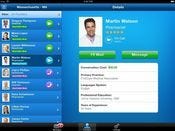41% of those who don't have online access to records would consider switching physicians to obtain it, Accenture survey finds.


7 E-Tools To Keep Patients Engaged
7 E-Tools To Keep Patients Engaged (click image for larger view and for slideshow)
Patients are pushing physicians for more online access to their medical records and to the doctors' practices, and they're starting to get their way, according to a new survey of patients and providers by the research and consulting firm Accenture.
More than a third of U.S. consumers say that their current medical providers allow them online access. Capabilities offered include prescription refill requests (48%), access to medical records (43%), appointment requests (43%), e-mail with providers (36%), and electronic reminders (36%). Depending on the item, between 28% and 40% of doctors say these electronic services are available to patients, Accenture reported.
[ Veterans say online access to doctors improved their health. Read more: Patients Like Online Health Records Access, Study Says. ]
Consumers want far more access to these services than they currently have, Accenture found. Eighty-two percent of consumers, for example, say that access to medical records is important to them. About three-quarters of them attach importance to online appointment booking (77%), prescription refill requests (76%), and receiving reminders via e-mail and text (74%). Sixty-nine percent say communicating with providers via e-mail is important.
These preferences vary by age group, with more 18- to 24-year-olds saying they want online appointment booking, reminders and e-mail communications than those 55 or older. Conversely, older consumers are more likely than younger ones to say that access to medical records is important.
Overall, however, consumers insist that their providers share medical records with them. Nearly a third of them say they cannot access their records online and another quarter of them are not sure if they can. Of the people in these two groups, 41% say they would consider switching to a provider who offers online access to their records. Kaveh Safavi, MD, managing director, North America Health, for Accenture, told InformationWeek that he isn't surprised by the implication that online record sharing is more important to many patients than a doctor's knowledge and skill. "If a patient has a very serious condition, they might want to go to a world expert and may not want to go anywhere else," he said. "But if I want to have a relationship with a pediatrician for my kids for 18 years, this [online access to records] may matter a lot to me."
Why would older people, many of whom have serious chronic conditions, place such a strong emphasis on record sharing? "One could suggest that if I have a chronic condition, I'd be more invested in caring for myself and need to have more of the information than if I have an acute condition," Safavi replied. "So people with chronic conditions might care more" about online access to their records.
Access to records tops the list of what consumers want online, he said, partly because of the similar services they already receive from other industries. "Patients are aware of the concept of us having access to our information. Think about financial services. It's our money. And this is our medical record. One might expect that consumers would have the same expectation of healthcare as they do from other services: 'It's my information, can I see it?'"
In addition, the Accenture report pointed out, many consumers now keep track of information about their own health. Consumers most commonly track their health history (37%), followed by their physical activity or diet (34%) and health indicators such as weight and blood pressure (33%). Being able to view their clinical records is a natural complement to that activity.
Nearly all doctors (96%) and consumers (98%) say that patients should be able to access their electronic health records. But while 84% of consumers want full access to those records, 65% of doctors say patients should have limited access. In addition, 81% of patients say they should be allowed to update their records.
A recent study by researchers at Harvard Medical School found that when physicians let patients view their progress notes -- the part of the record they were most reluctant to share -- patients' compliance with prescribed medications grew. Moreover, the doctors' earlier fears that note sharing would increase their workload and confuse patients proved unfounded.
"That was very interesting, because the doctors who were reticent [to share their progress notes], once they engaged in it, they realized it wasn't so bad and they actually liked it a lot," Savafi commented. "But there was a lot of resistance before they decided to try it." Noting that Meaningful Use stage 2 requires physicians to share records with patients, he said that this part of the government EHR incentive program reflects as well as encourages the changes going on in the doctor-patient relationship.
"The traditional concept of the medical record was it was something the doctor had, and the patient's only role was to carry it around from one place to another," he explained. "When the patient can view the record, interact it, and potentially add things to it, this is a real platform for a shared relationship."
About the Author(s)
You May Also Like







